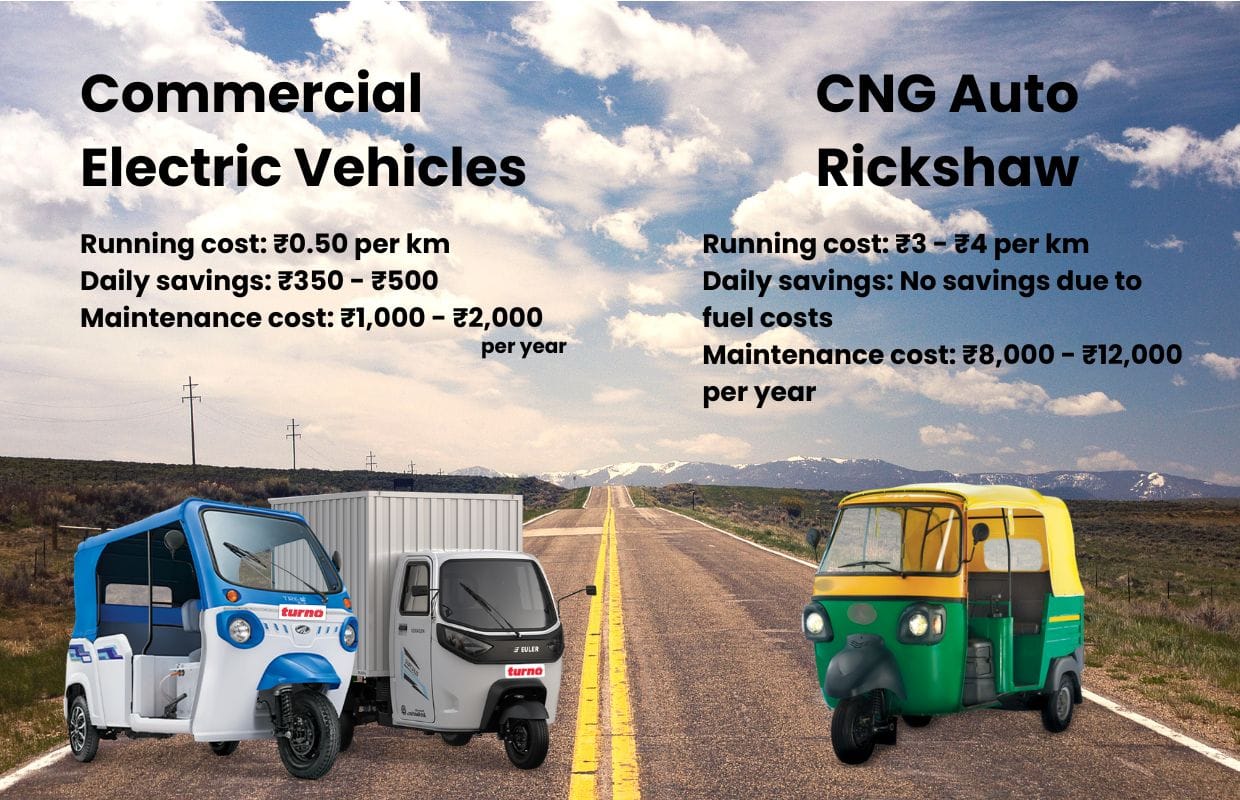The conventional auto-rickshaw sector is changing significantly as a result of the popularity of electric auto-rickshaws, or e-rickshaws. E-rickshaws have a number of advantages over typical auto-rickshaws, including lower running costs, increased accessibility, and environmental friendliness. This switch to electric auto has the potential to have a big influence on regional economies, opening up new job opportunities and enabling cutting-edge business models.

How are Electric Auto-Rickshaws Impacting Local Economies?
Let us explore the impact of e-rickshaws on local economies in more detail and discuss the potential benefits.
Reduced Operating Costs
The decreased running expenses of e-rickshaws as opposed to conventional auto-rickshaws are one of their most important advantages. Electricity, which is far less expensive than petrol or fuel, is used to power e-rickshaws. This results in cheaper fuel costs, maintenance costs, and operational expenditures all around for drivers of e-rickshaws. As a result, e-rickshaw drivers may charge less for their services, increasing their ability to compete in the market.
Environmental Advantages
E-rickshaws or electric load vehicles are eco-friendly since they emit no pollution. The environment and public health may be negatively impacted by the traditional auto-rickshaws' very loud engines and air pollutants. By switching to e-rickshaws, metropolitan areas may become cleaner and healthier, which may have a good effect on regional economy.
Increased Employment Opportunities
The shift to e-rickshaws can also create new employment opportunities for people. Electric auto-rickshaws require specialized skills and knowledge to operate and maintain, which can result in new jobs in manufacturing, maintenance, and repair. Moreover, the lower operating costs of e-rickshaws can result in more drivers entering the market, leading to increased competition and potentially lower rates for consumers.
Improved Accessibility
E-rickshaws are accessible to a broader range of people as they are more affordable than traditional auto-rickshaws. This means that people with lower incomes can now access affordable and reliable transportation, which can positively impact their daily lives. Moreover, e-rickshaws are smaller and more maneuverable than traditional auto-rickshaws, making them more accessible to people in congested urban areas with narrow roads.
Potential Challenges
E-rickshaws provide a number of advantages, but there may also be issues that need to be resolved. For instance, the market may become oversaturated as a result of the quick uptake of e-rickshaws, resulting in lower profitability for the drivers. Additionally, the absence of clear regulations governing e-rickshaws may raise questions about both the safety of the drivers and the passengers.
Higher Energy Security
For their transportation needs, several nations rely largely on imported fossil fuels, which might pose problems for energy security. However, the switch to electric auto and trucks, including e-rickshaws, can lessen reliance on foreign imports of fossil fuels and boost energy security. Countries may lessen their reliance on imported fuels and increase their energy independence by powering e-rickshaws with domestically generated electricity.
Potential for Innovative Business Models
The rise of e-rickshaws has the potential to facilitate innovative business models that can benefit both drivers and passengers. For example, some companies are developing platforms that allow passengers to book e-rickshaw rides through mobile apps, similar to popular ride-hailing services. This can create new revenue streams for drivers and improve convenience for passengers.
Improved Road Safety
E-rickshaws are generally safer than traditional auto-rickshaws as they are equipped with better brakes, suspension systems, and safety features. Moreover, e-rickshaws are subject to fewer breakdowns than traditional auto-rickshaws, reducing the risk of accidents due to mechanical failures. As a result, the shift to e-rickshaws can improve road safety and reduce the number of accidents, which can have significant economic benefits by reducing medical expenses, property damage, and insurance costs.
Possibility of Lessening Congestion
E-rickshaws have the potential to be a more effective form of transportation in crowded metropolitan settings than traditional auto-rickshaws. Due to their lower size and increased manoeuvrability, e-rickshaws can more easily move through crowded places and tight roadways. By shortening travel times and increasing production, this can ease traffic congestion and improve general flow, both of which can have a positive impact on the economy.
Traditional auto-rickshaw industry
The conventional auto-rickshaw sector might be negatively impacted by the transition to e-rickshaws. E-rickshaw drivers may see increasing competition and lower profitability when electric load vehicles (EVs) gain popularity. Some conventional auto-rickshaw drivers could be able to switch to operating e-rickshaws, opening up new career prospects for them.
Comparison of the Impact of Electric Auto-Rickshaw vs. Traditional Auto-Rickshaw on the Economy
Here is a table that highlights some of the ways in which electric and traditional auto-rickshaws impact the economy:
In general, switching to electric auto-rickshaws has the potential to have a positive impact on the economy, society, and environment. The transition must be managed in a way that balances the interests of all parties involved and takes into account any obstacles. By doing this, nations may construct sustainable transport networks that enhance the quality of life for their population and promote economic growth.
To know more about Electric load vehicles or to buy Electric Autos visit Turno!




